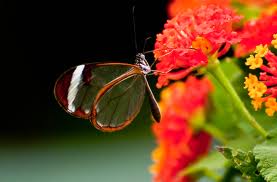 They bring life to rainforests, both with their brilliant colors and with the magnificent flowers they help to pollinate. Everyone loves butterflies – these delicate creatures flit and fly gracefully, brightening our gardens and wild spaces. Their beauty and allure has given butterflies a special place in both ancient and modern cultures. Many societies, including the ancient Greeks, believed that butterflies represented the human soul; and in China and Japan, butterflies represent the presence of loved ones.
They bring life to rainforests, both with their brilliant colors and with the magnificent flowers they help to pollinate. Everyone loves butterflies – these delicate creatures flit and fly gracefully, brightening our gardens and wild spaces. Their beauty and allure has given butterflies a special place in both ancient and modern cultures. Many societies, including the ancient Greeks, believed that butterflies represented the human soul; and in China and Japan, butterflies represent the presence of loved ones.
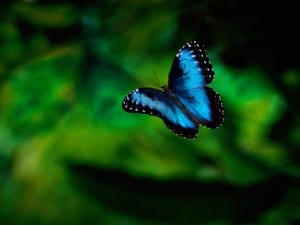 Costa Rica is unusually blessed with incredible diversity of butterflies. There exists about 17,500 species of butterflies in the world, according to the Smithsonian Institute. Costa Rica is home to about 1,251 species of butterflies and at least 8,000 species of moths, according to Wikipedia. One reason for this biodiversity is that millions of years ago, Costa Rica and Panama formed a bridge between North and South America, so plants and animal species were able to spread between the continents.
Costa Rica is unusually blessed with incredible diversity of butterflies. There exists about 17,500 species of butterflies in the world, according to the Smithsonian Institute. Costa Rica is home to about 1,251 species of butterflies and at least 8,000 species of moths, according to Wikipedia. One reason for this biodiversity is that millions of years ago, Costa Rica and Panama formed a bridge between North and South America, so plants and animal species were able to spread between the continents.
You can always find plenty of butterflies throughout Costa Rica’s many microclimates and habitats. For more educated observation, visit one of the country’s many butterfly gardens, which offer guided tours and personal interaction with numerous species.
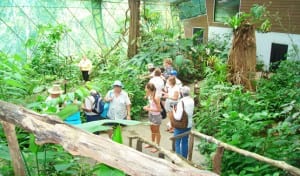 The Butterfly Garden at Veragua Rainforest Research & Adventure, in Costa Rica’s Caribbean rainforest, is inhabited by some of the most colorful butterflies in the world. A tour at this 1,300 hectare (3,212 acre) biology research and adventure center lets you walk through an immense live butterfly garden, plus visit their research lab where staff scientists study the behavior and lifestyle of these vivid flying insects.
The Butterfly Garden at Veragua Rainforest Research & Adventure, in Costa Rica’s Caribbean rainforest, is inhabited by some of the most colorful butterflies in the world. A tour at this 1,300 hectare (3,212 acre) biology research and adventure center lets you walk through an immense live butterfly garden, plus visit their research lab where staff scientists study the behavior and lifestyle of these vivid flying insects.
Veragua Rainforest Research & Adventure is located in the Talamanca foothills about an hour inland from Costa Rica’s historic Caribbean port town of Limón. Veragua’s property contains walking trails through the rainforest, a river and waterfall, an aerial tramway, a canopy zip line tour, biology research station and wildlife habitats, along with a restaurant, café and souvenir shop.
Some of the butterflies you may see at Veragua Rainforest include: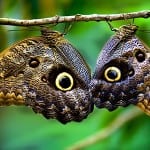
- The famous beautiful Blue Morpho Butterfly (Morpho peleides limpida) with its electric blue and black wings, and its lilting, casual flight;
- The Owl Butterfly (Caligo eurilochus) with its unique tan, black and blue wings that have a large spot like an owl’s eye;
- The Postman Butterfly (Heliconius melpomene) which has wide, slender wings that are black with bright red vertical bands, and white horizontal stripes on the lower wings;
- The snowy white Florida White Butterfly (Appias drusilla) with its almost bouncy flight, as if pulled along by gusts of wind.
- The beautiful Ruby-spotted Swallowtail Butterfly (Papilio anchisiades idaeus) that is predominately black, with ruby-red markings on its wings, and is the most common and abundant swallowtail in Costa Rica.
Veragua Rainforest offers an unforgettable student learning experience in the Costa Rican Central Caribbean region with its educational program. They provide educators and students with an opportunity for hands-on research, 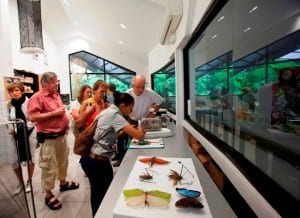 sustainability and cultural sensibility. Veragua’s Research Station is closely aligned with the School of Biology of the University of Costa Rica (UCR) and Costa Rica’s National Museum of Natural History. Students can see how Veragua researchers study rainforest life, and how they discover new species.
sustainability and cultural sensibility. Veragua’s Research Station is closely aligned with the School of Biology of the University of Costa Rica (UCR) and Costa Rica’s National Museum of Natural History. Students can see how Veragua researchers study rainforest life, and how they discover new species.
Veragua Rainforest Research & Adventure is open to day visitors Tuesday to Sunday, from 8:00 am to 3:00 pm. Admission is $66 for adults and $55 for children/students; children under age 4 receive free admission. Veragua is located 40 minutes from Limon and 2 ½ hours from San José, in Brisas de Veragua, 12 km south from the Liverpool entrance on the highway to Limón.
Facts about Butterflies:
- Butterflies are members of the insect class.
- They use their antennae for balance and smell.
- Their four-part wings are very delicate and easily damaged.
- Though their eyes are large and complex, butterflies have only basic sight – images are blurry, and butterflies essentially see only motion, light and color.
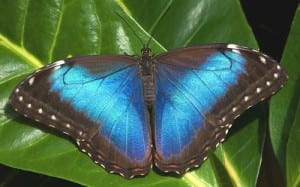 Butterflies play the important ecological role of pollinator.
Butterflies play the important ecological role of pollinator.- In addition to sweet nectar, butterflies also feast on tree sap, rotting fruit and dissolved minerals often found in wet sand, dirt and animal dung.
- A butterfly’s main goal in life is to reproduce. After mating, female butterflies lay approximately 100 eggs, the total for their lifetime.
- Only 2-5% of the eggs will mature into healthy adult butterflies; the rest will be eaten by predators, lost to disease or other natural dangers.
- Butterfly eggs hatch into butterfly larvae, or caterpillars.
- Caterpillars eat their way though all sorts of vegetable matter over the course of 10-60 days, growing strong and plump before entering the pupa or chrysalis phase.
- Hanging upside-down from a leaf or branch, mature caterpillars spin the chrysalis, or cocoon.
- When it is fully developed, a fully-grown butterfly emerges.
- Butterflies only live a total of 3-4 weeks.
By Shannon Farley
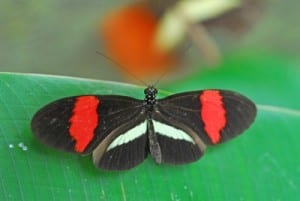
Comments